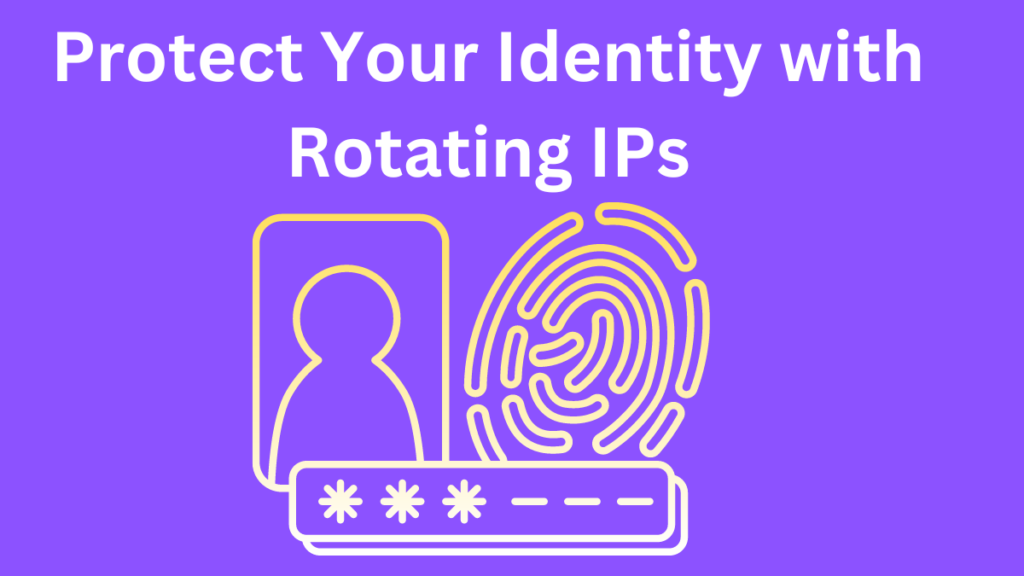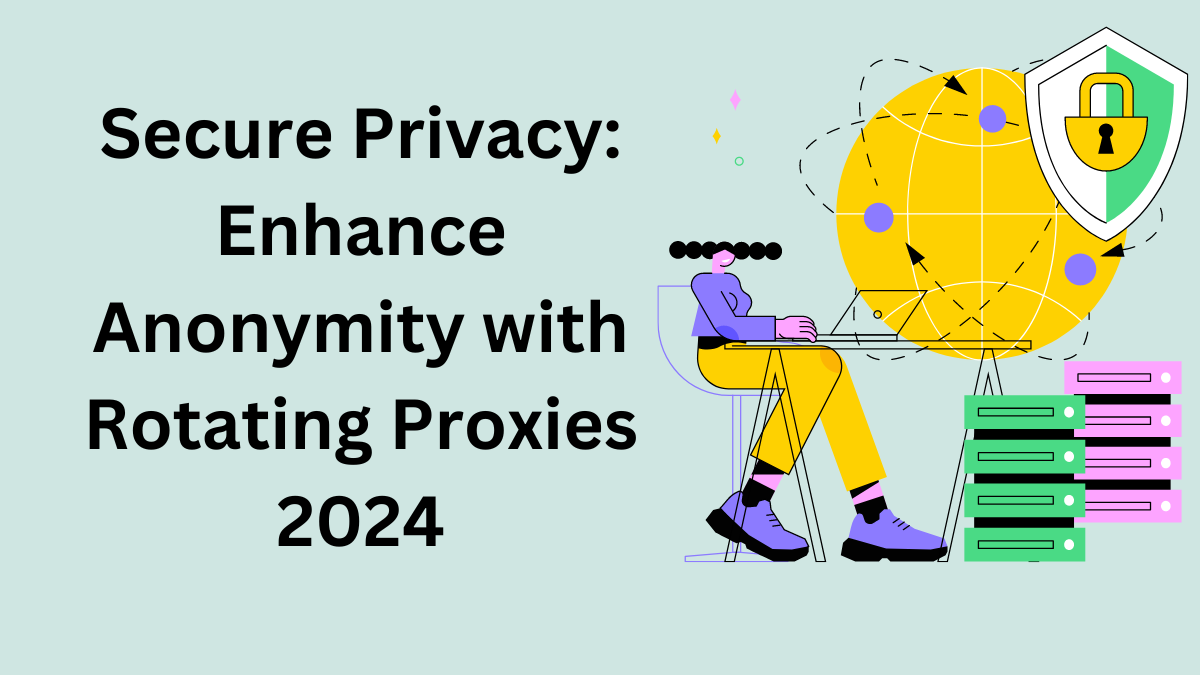In today's digital age, where online privacy is increasingly becoming a concern, individuals and businesses alike are seeking ways to safeguard their identities and sensitive information from prying eyes. One effective solution that has gained popularity is the use of rotating IPs. In this article, we'll delve into the concept of rotating IPs, why protecting your identity is crucial, how they work, their benefits, and practical tips for utilizing them effectively.
Introduction to Rotating IPs
Rotating IPs refer to the practice of regularly changing your IP address while browsing the internet. An IP address serves as a unique identifier for your device when connected to the internet. By rotating IPs, users can prevent websites, advertisers, and malicious entities from tracking their online activities and gathering personal data.

Why Protecting Your Identity is Important
In an era where data breaches and online surveillance are rampant, protecting one's identity is paramount. Your online footprint can reveal sensitive information about your browsing habits, preferences, and even financial transactions. Without adequate protection, you risk falling victim to identity theft, cyber-attacks, and invasive targeted advertising.
How Rotating IPs Work
Rotating IPs work by rerouting your internet traffic through different IP addresses at regular intervals. This process obscures your true IP address, making it difficult for third parties to trace your online activities back to you. Depending on the rotating IP service you choose, the frequency and method of IP rotation may vary.
Benefits of Using Rotating IPs

Enhanced Online Privacy
By constantly changing your IP address, rotating IPs offer a higher level of anonymity and privacy online. This makes it challenging for websites and online services to track and profile your browsing behavior.
Protection Against Cyber Threats
Rotating IPs can help mitigate the risk of cyber-attacks such as DDoS (Distributed Denial of Service) attacks, phishing attempts, and malware infections. By masking your IP address, you reduce the likelihood of becoming a target for malicious actors.
Bypassing Geo-Restrictions
Some websites and online services impose geo-restrictions based on users' IP addresses. With rotating IPs, you can circumvent these restrictions and access region-locked content and services from anywhere in the world.
Types of Rotating IP Services
There are several types of rotating IP services available, each with its own set of features and functionalities:
Proxy Servers
Proxy servers act as intermediaries between your device and the internet. They route your internet traffic through their own IP addresses, effectively masking your real IP address.
VPNs (Virtual Private Networks)
VPNs encrypt your internet connection and route it through servers located in different geographic locations. This not only hides your IP address but also secures your data from interception by hackers and government surveillance.
Tor Network
The Tor network, also known as The Onion Router, is a decentralized network that routes your internet traffic through a series of volunteer-operated servers. It provides a high level of anonymity by encrypting and bouncing your connection through multiple relays.
Factors to Consider When Choosing a Rotating IP Service
When selecting a rotating IP service, it's essential to consider the following factors:
Speed and Reliability
Ensure that the service offers fast and reliable connections to prevent latency issues and downtime.
Security Features
Look for features such as encryption, DNS leak protection, and a kill switch to enhance your online security and privacy.
Pricing Plans
Compare pricing plans and subscription options to find a service that fits your budget and requirements.
Customer Support
Choose a provider that offers responsive customer support to assist you with any technical issues or inquiries.
How to Set Up and Use Rotating IPs
Setting up and using rotating IPs is relatively straightforward:
- Installing and Configuring the Service: Download and install the rotating IP software or app on your device.
- Choosing the Right IP Rotation Settings: Customize the IP rotation settings based on your preferences and requirements. Options may include random rotation intervals, specific geographic locations, and protocol preferences.
Best Practices for Protecting Your Identity with Rotating IPs
To maximize the effectiveness of rotating IPs, consider implementing the following best practices:
Regularly Change IP Addresses
Frequently rotate your IP addresses to prevent online tracking and profiling by websites and advertisers.
Enable Encryption
Encrypt your internet connection with protocols such as SSL/TLS or AES to safeguard your data from interception and eavesdropping.
Use Multi-Layered Security Measures
Combine rotating IPs with other security tools such as antivirus software, firewalls, and ad blockers for comprehensive protection against online threats.
Real-Life Applications of Rotating IPs
Rotating IPs have various practical applications beyond just enhancing online privacy:
Online Privacy Protection
Protect your personal information and browsing history from surveillance and data harvesting by utilizing rotating IPs.
Data Scraping and Web Crawling
Researchers and businesses can use rotating IPs to collect data from websites without being blocked or detected.
Market Research and Competitive Analysis
Gain insights into market trends and competitors' strategies by anonymously gathering data from online sources using rotating IPs.
Common Misconceptions About Rotating IPs
Despite their benefits, there are some misconceptions surrounding rotating IPs:
They Are Illegal
Using rotating IPs for legitimate purposes such as enhancing online privacy and security is entirely legal. However, engaging in illegal activities such as hacking or copyright infringement using rotating IPs is prohibited.
They Slow Down Internet Speed
While some degree of latency may occur when using rotating IPs, modern services are optimized to minimize speed reductions and ensure smooth browsing experiences.
They Offer Complete Anonymity
While rotating IPs can enhance anonymity online, they do not guarantee absolute anonymity. Additional precautions such as using encrypted communication protocols and practicing good digital hygiene are necessary for maximum privacy.
Conclusion
Protecting your identity online is essential in today's interconnected world, where privacy breaches and cyber threats are rampant. Rotating IPs offer a practical solution for safeguarding your online activities and personal information from prying eyes. By regularly changing your IP address and utilizing encryption technologies, you can enhance your online privacy and security significantly.
FAQs (Frequently Asked Questions)
- Is using rotating IPs legal?
- Yes, using rotating IPs for legitimate purposes such as enhancing online privacy and security is legal. However, engaging in illegal activities using rotating IPs is prohibited.
- Do rotating IPs slow down internet speed?
- While some latency may occur when using rotating IPs, modern services are optimized to minimize speed reductions and ensure smooth browsing experiences.
- Can rotating IPs provide complete anonymity?
- While rotating IPs can enhance anonymity online, they do not guarantee absolute anonymity. Additional precautions such as using encrypted communication protocols and practicing good digital hygiene are necessary for maximum privacy.
- How often should I change my IP address?
- The frequency of IP address rotation depends on your specific needs and preferences. Some users may opt for frequent rotations, while others may prefer less frequent changes.
- Are there any risks associated with using rotating IPs?
- While rotating IPs can enhance online privacy and security, there are potential risks such as IP address blacklisting and service disruptions. It's essential to choose a reputable provider and follow best practices to mitigate these risks.




